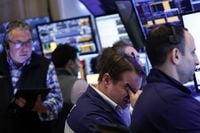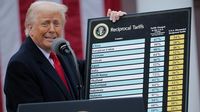U.S. stock markets plummeted on Thursday, April 3, 2025, as investors reacted to President Donald Trump's sweeping retaliatory tariffs announced during a White House Rose Garden news conference the day before. The Dow Jones Industrial Average fell 1,570 points, marking a 3.7% decline, while the Nasdaq dropped nearly 5% and the S&P 500 fell by 4%. This downturn signals the worst day for the markets since March 2020, during the early days of the COVID-19 pandemic.
Individual stocks were not spared from the fallout. Tech giants like Apple and Meta saw their shares decline by 8% each, while Amazon's stock plummeted by 9.5%. The entertainment sector also felt the sting, with Disney shares down 6%, Warner Bros. Discovery off by 8%, Fox Corp slipping 5%, and Roku tumbling 15%. Although the entertainment industry found some solace in the fact that services and digital products are exempt from the tariffs, the broader economic implications remain concerning.
The tariffs, which will be implemented in stages starting April 5, include a baseline 10% reciprocal tariff on all trading partners, with specific higher rates for countries like China (34%), India (26%), Taiwan (32%), Thailand (36%), and Vietnam (46%). The European Union will face a 20% tariff. Analysts fear that the tariffs will exacerbate inflation and lead to increased costs for businesses of all sizes, potentially causing a pullback in advertising spending as companies seek to cut costs.
As the market reacted, futures began to decline sharply during Trump's announcement. The uncertainty surrounding these tariffs raises several questions: How will companies respond to the mandate to bring manufacturing back to the United States? Will other countries retaliate? And could dissent within the Republican Party, exemplified by Senator Rand Paul’s criticism of the tariffs, hinder their implementation?
Krish Sankar, a tech analyst at TD Cowen, described the tariffs as a "disruptive" move, noting the potential for increased U.S.-based server manufacturing. However, he cautioned that the capacity for manufacturing PCs and smartphones in the U.S. remains limited. Derrick Kam, an economist at Morgan Stanley, echoed this sentiment, suggesting that many companies may choose to wait out the uncertainty rather than make immediate changes.
U.S. Commerce Secretary Howard Lutnick defended the tariffs in a CNBC interview, asserting that "America needs to protect itself" and that "these countries need to fundamentally alter the way they do business." His remarks aimed to reassure investors and businesses alike, but the market's reaction tells a different story.
The advertising sector is particularly anxious about the tariffs' impact on spending. A survey conducted by the Interactive Advertising Bureau (IAB) in February 2025 revealed that 94% of advertising decision-makers expressed concern about the tariffs' effects on their budgets. Of those surveyed, 57% indicated they were "extremely concerned," while 37% were "somewhat concerned." Traditional media and social advertising are expected to experience the most significant budget cuts, while connected TV and online video may prove more resilient.
In the entertainment sector, Lionsgate Entertainment shares fell 7.6% to $7.34, and Lionsgate Studios dropped 7.2% to $7.03 per share. Warner Bros. Discovery stock also fell 7.6% to $9.76, while Disney shares decreased over 5% to $92.15. Other media companies like Fox Corp, Paramount, and Comcast saw declines of 4.7%, 2%, and 1.7%, respectively.
In tech, Amazon’s stock fell 9.5% to $177.22, Apple dropped 8.4% to $205.07, and Meta fell 8% to $536.94. Alphabet and Netflix also saw reductions of 3.8% and 1.38%, respectively. The combined losses across these sectors reflect a growing apprehension about the economic landscape shaped by these tariffs.
The tariffs are part of a broader strategy by the Trump administration to reshape the global trading system, which has been in place since World War II. As the U.S. moves towards this new approach, the uncertainty surrounding the tariffs adds to the existing market volatility.
As the situation unfolds, investors and analysts will be closely monitoring how companies respond to the tariffs, the potential for retaliatory measures from other nations, and the political ramifications of dissent within the Republican Party. With many questions left unanswered, the economic landscape appears more unpredictable than ever.
In summary, the announcement of these tariffs has sent shockwaves through the U.S. stock markets, creating a climate of uncertainty that could have far-reaching implications for both the economy and the global trading system.





